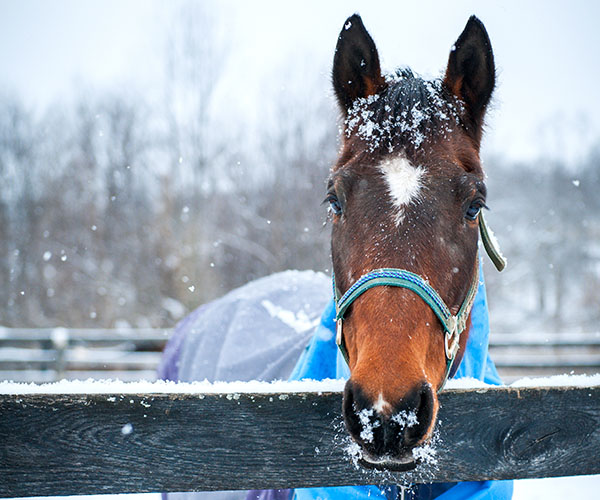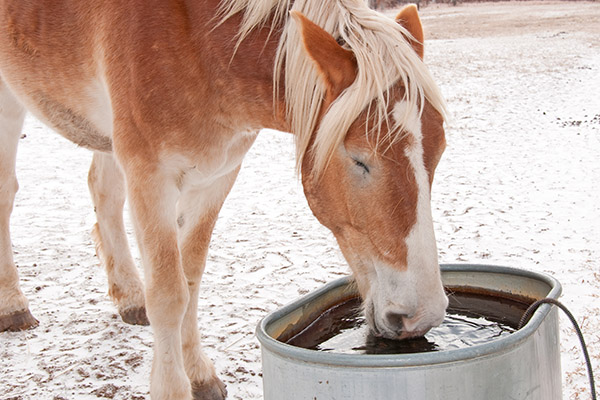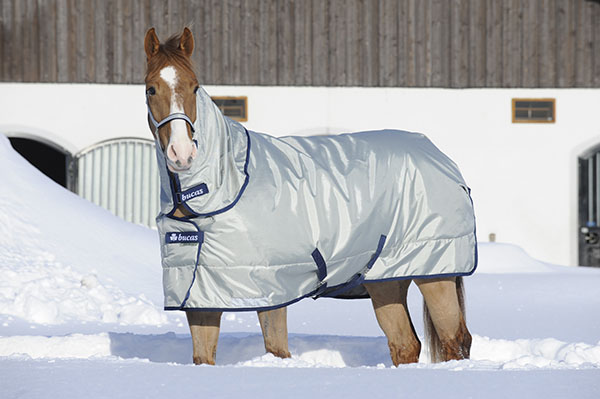
It is natural to wonder how you can keep your senior horse comfortable with a forecast of snow, sleet, wind, and sub-zero temperatures. As our friends age and enter their golden years, there are additional health considerations which must be made. Generally, a senior horse is considered a horse over 15 years of age, since this tends to be the point at which changes in their metabolism and immune system can be noticed.
We have compiled some quick tips to help you keep your senior horse content and cozy in the frigid weather. Hopefully knowing that your horse is at ease will make it easier for you to enjoy another winter season in New England.
Drink Up!
Water is an essential part of keeping your senior horse healthy, whatever the weather may be. Winter is certainly no exception, but it may be harder to keep your horse drinking consistently. Horses who do not have adequate water intake are at an increased risk for impaction colic, dehydration, and decreased body condition and bodily functions.
By utilizing a heated bucket or deicer, you can avoid ice and keep your horse’s water flowing freely. Be sure that you inspect the heater daily to verify that it is functioning properly and safely. Learn more about the importance of water during the winter on our blog post, Bottoms Up! Encouraging Water Consumption in Cold Temperatures.

Meal Planning
Your horse’s nutritional requirements will change as the mercury drops. Many senior horses already have a decrease in their digestive efficiency, so they require more calories than their younger counterparts. According to Marsha Hathaway, PhD, Professor Muscle Growth Biology and Equine Nutrition at the University of Minnesota, horses require an additional 1% of energy for each degree below 18° Fahrenheit. In order to provide these calories, she explains that it is beneficial to provide more hay since, “there is the heat generated from microbial fermentation of forages that occurs in the hindgut during digestion.”
When the temperatures drop to an extreme level, it is suggested that you provide your horse with free choice hay so that they are able to eat as much as they want. If your senior horse has trouble chewing their long stem hay, consider a chopped hay product or hay cubes to supplement or even replace their forage requirements.
In addition to increased forage, many equine nutritionists also recommend slightly increasing the amount of senior grain that you feed during the winter to add more calories to their diet. Be sure to monitor their body condition and adjust the amount of grain you feed as needed. As always, all changes in your horse’s feeding regime should be made gradually so their digestive system has time to adapt.
If your horse drops weight during the winter, even with increased forage and grain consumption, consider adding a weight gain supplement to your horse’s rations to help them build their fat stores.
Home, Sweet Home
Providing your senior horse with adequate shelter is essential to their wellbeing. Hathaway explains, “We estimate that a horse with a healthy winter coat will be comfortable at temperatures down to 18° F; but if the horse has access to a shelter, it can tolerate temperatures as low as -40° F.” Keep your senior horses warm and dry by keeping them in a pasture with a suitable run-in shed or bringing them into the barn during times of inclement weather and extreme temperature drops.
Because your horse will most likely be spending more time than usual in their stall or run-in, consider using rubber mats to add cushion to their flooring which helps keep your horse’s joints comfortable. Some horses prefer to spend the majority of their time in a stall, while others like the freedom of turnout to keep their muscles moving and warm and prevent their joints from stiffening.
If your horse prefers to be in a stall, ammonia levels will be on the rise and can reach harmful levels quite quickly, especially in a closed barn environment. Put a stop to odor issues by treating the area with a stall deodorizing product to effectively remove ammonia from the environment and maintain respiratory health.
Remember Your Coat
Not all horses need to wear blankets in the winter; and depending on your horse’s breed, age, and workload, you may or may not need to blanket. However, many senior horses benefit from blankets so that they do not need to expend as much energy to stay warm. If you choose to blanket your horse, you need to watch the weather and adjust their blankets accordingly.
Horses should never be sweaty under their blankets, but the blankets must provide adequate insulation, since they impede a horse’s natural insulating abilities. Many equestrians utilize a combination of waterproof turnout sheets and warmer turnout blankets to adjust for changing temperatures when their horses are outside. When in their stalls, stable sheets and stable blankets are a popular choice. Our blog post, Understanding Horse Blankets, can provide you with further information about selecting the right blanket(s) for your horse depending on the forecast.
If your horse wears blankets, you should periodically remove them to keep tabs on their weight and check on the condition of their skin and hair coat.

Keep Warm
If your golden oldie suffers from insulin resistance (IR) or is prone to laminitis, there are additional factors which should be considered. Many studies suggest that in this senior horse population, blood flow to the extremities may decrease in the cold weather due to constricted blood vessels. This may cause soreness and an increased propensity for laminitis.
Tackle this issue by adding an additional layer to your horse’s legs which will insulate their legs and support healthy circulation. Standing leg wraps and fleece polos are a popular way to keep your horse’s legs warm, or you might also consider a set of Back on Track Exercise Boots or Professional’s Choice VenTECH Elite Sports Medicine Boots.
Know Your Horse
The most important tools that you can use to keep your horse healthy are your own intuition and a close relationship with your veterinarian. You know your equine companion best and are aware of their normal behaviors. Keep a close eye on changes in their personality and daily habits, since this may indicate that something is awry. It can also be helpful to take periodic photos so that you can keep close tabs on your horse’s weight and body condition. Contact your veterinarian immediately if you suspect your horse’s behaviors are changing as it may signify a larger problem.
As old man winter bears down, do all you can to keep your senior horse warm, healthy, and comfortable.. But it is important to remember that unlike us, they were made for this weather and are often able to handle it, provided we do our part to provide them with the necessary nutrition and equipment.
